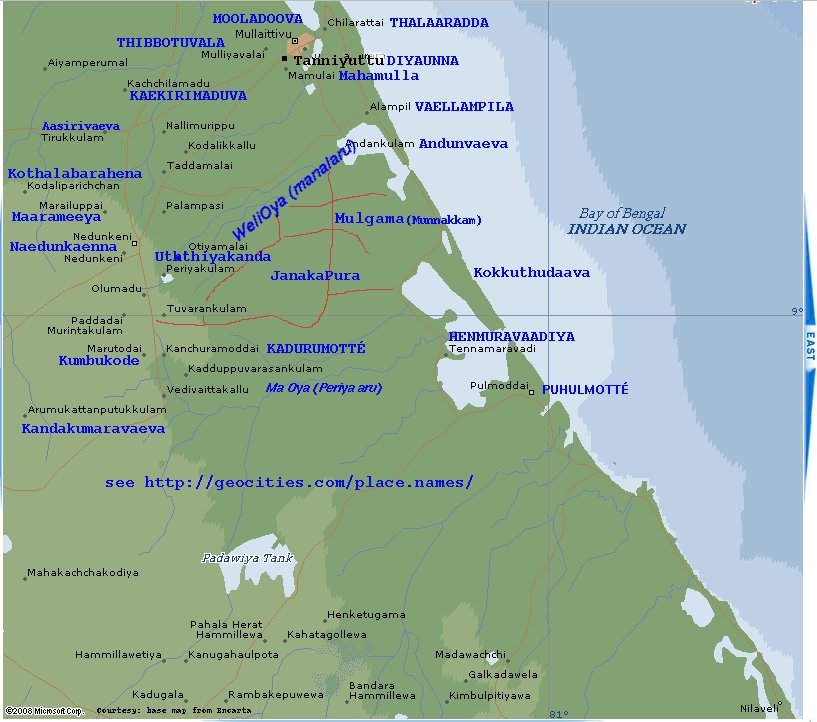(July 14, 2009) The Director General of Sri Lanka Mahaweli Authority Dharmasiri de Alwis has told the state-owned Dinamina newspaper today that 2500 families will be settled in Nedunkarni in Mullaithivu district under the Welioya project of the Mahaweli L-zone. Each family will be granted one acre for paddy cultivation, half an acre for coconut growing and one acre for the home garden.
Nedunkarni is a Tamil dominated area centered by a small town and the residents are now internally displaced in camps in Vavuniya. Dinamina report does not mention anything about the ethnicity of the settlers in the new colonies.
We consider this as a very sensitive political issue that should be handled with utmost care. Mahaweli Authority should not be the sole competent authority in this regard.
The idea that the Sinhala invaders are colonizing their land is one of the basic tools manipulated by the Tamil nationalists to fuel the passion on the homeland among Tamils. This phenomenon presented as Sinhala colonization was vehemently resisted by Tamils.
In the early colonization process, the traditional dwellers of the lands as such in Galoya etc. were integrated to the new colonies. The ethnic ratio among the settlers was also considered. But this situation gradually changed later.
In the late 1950s, Pihimbiyagollewe Dhammaloka Thero, a young Buddhist monk who had settled in Padaviya blocked Tamils being settled in the Eastern parts of the Padaviya colony with the auspices of the Sinhala politicians. Entire Padaviya settlement was tuened to a Sinhala colony and later in 1980s the traditional Tamil villagers like Thennamaravadi in the Eastern coast off Padaviya were also wiped out.
Through this process, a wall of Sinhala villages was erected in between the Northern and Eastern Provinces. It can be observed that the colonization process in the age of the D.S. Senanayaka aimed at undermining the separatist trends among the minorities. But the late colonization were attempts to spread Sinhala chauvinism.
Herman Malinga Bandara, a civil servant engaged in colonization in Welioya has clearly hinted in his book ‘For a sovereign State' that Sinhala chauvinist interests were behind the setting up of Welioya colony in the northeastern parts of Sri Lanka.
Before Welioya colony was set up, this area was dominated by the farms like Dollar, Kent and Ceylon Theaters Farm etc. that were set up in long leased crown land. An NGO called Gandhiyam Movement had settled some Tamils that had been displaced from the southern parts of the island due to ethnic violence in the abandoned land of these fams. Militant groups like PLOTE led by Uma Maheswaran were also active among these displaced persons. Ill-famous Dollar and Kent Farm massacres of Sinhala settlers and the retaliatory massacre of Tamil villagers in nearby Othiyamale were a beginning of a new era of bloodshed in this zone that took hundreds of lives of Sinhala and Tamil peasants.
Welioya was later earmarked as Mahaweli L-zone. Under the original plan, 39,000 hectare land belonged to Anuradhapura, Vavuniya and Mullaithivu administrative districts were divided into six zones. They include Sampathnuwara, Janakapura, Kokilai, Nedunkarni and Nayaru areas but only two zones were developed so far, say the Mahaweli Authority. The other zones could not be developed due to the unsafe conditions. There are settlements in Nikaweva, Ehetugasweva, Kiribbanweva, Janakapura , Kalyanipura, New Monaraweva and New Gajabapura areas. People were settled in some other areas of Gajabapura, Monaraweva, Helambaweva, Kambiliweva, Konweva, Veheraweva and parts of Kalyanipura but they vacated those areas due to security concerns.
Mahaweli Authority says that 5000 families were settled in Welioya area during the past 22 years. 3364 of them were settled in legally allocated land and the others were squatters. They were leaving and coming back time to time due to security issues.




![Reblog this post [with Zemanta]](http://img.zemanta.com/reblog_e.png?x-id=1188a0a4-a64f-499f-bff2-aa92f3665eb6)



